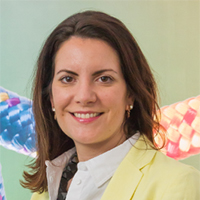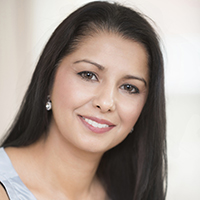Aneesh Gopalakrishnan FBCS
Aneesh Gopalakrishnan FBCS is a Principal Software Engineer with LINK Logistics. He is also a Microsoft MVP and founder of Startup+, a startup community in New York City. Below, he tells us about his history of becoming a Fellow and advises other young professionals in the industry.
Tell us a bit about where you work and your job role?
I am a Principal Software Engineer with LINK Logistics, the largest U.S.-only owner and operator of last-mile industrial real estate. Besides mentoring engineers, Aneesh oversees the architecture, design, building, hosting, and scaling of multiple teams across cloud-native, cross-platform web and mobile applications.
What is your professional background?
I have a traditional professional college degree in Computer Science and Engineering from the University of Kerala. After graduating in 2004, and after a challenging job hunt, I finally ended up joining XStream Software, an Indian subsidiary of a Canadian firm. They developed computer simulation software using C++. I joined Philips in 2006 in their healthcare division, writing image processing software for a workstation called IMALYTICS. The workstation helped analyze CT, PET, and SPECT images. As the recession hit in 2008, the project was shelved at that time, and I moved to Sapient, a consulting firm. I worked there on several projects, including scandichotels.com. Prior to moving to the USA, I joined Dell for a brief stint and worked on their Center of Excellence team. I moved stateside in 2012, was part of a team that rewrote geico.com, and eventually ended up at the NYC School Construction Authority, where I spent ten years building modern web and mobile apps. I recently moved to LINK Logistics as a Principal Software Engineer.
How long have you been a BCS Fellow?
I was awarded a BCS fellowship in 2023. So I would say I am a newbie.
What drove you to become a BCS Fellow?
I have always been passionate about computer science and its potential to change the world. Over 20 years, I have worked on numerous projects where I could see its impact first-hand. I have also been actively involved in the developer and startup community, running and speaking at events and sharing what I learn through publications, presentations, and mentoring. I have been volunteering with several non-profit organisations for about half a decade, mentoring at coding academies and helping .NET Foundation and OpenJC with volunteer tasks requiring my technical expertise and marketing skills. Becoming a BCS Fellow was a natural progression for me, as it reflects my achievements and contributions to the profession and opens up new opportunities to shape the future of IT.
What impact do you see being a BCS Fellow will have on your career?
In this world of AI becoming an everyday tool, a seat at the table where the future of IT is being questioned is more crucial than ever. I have seen several BCS Fellows use their credibility to initiate and shape discussions, thus impacting governance and policies that would impact our not-so-distant future. BCS also offers several benefits and services to its Fellows, such as access to exclusive resources, events, and advocacy, which I am particularly interested in. I firmly believe that becoming a BCS Fellow will enable me to develop my skills and knowledge further, expand my professional network, and inspire others to pursue excellence in IT.
What are the benefits of being a Fellow of BCS?
Though when I applied to be the BCS Fellowship, my primary objective was to use it as an honour and credibility, I soon realized that it gives me access to many tools and tremendous networking opportunities. BCS Fellowship has opened the world of exclusive volunteer opportunities and a seat at the table of a credible organization shaping the world of IT professionals. In every other profession, professional bodies like BCS exist, and they influence the future of the profession. Examples are Doctor's associations and Chartered Institutes etc. BCS fills that void for IT professionals, and a Fellowship at BCS is highly respected and regarded.
Where do you see yourself in the future?
I would like to build and run my startup in the near future. I believe I have the experience, knowledge, and network to do so.
Any further wisdom you wish to share with us!
Having worked in several industries and with a career spanning 20 years, my feeling about this field differs from when I started. Computer science is not only about technology but also about people. Let me rephrase that - It is more about people and less about technology. Technology is a tool that can change us and everyone around us; it is up to us to choose which way the change ought to be. Technology can solve problems, create opportunities, and improve lives if we put them to be. Also, always consider the ethical, social, and environmental implications of our actions and the actions of whom we work with. We need to share our knowledge and experience and not hoard it. Finally, we need to inspire the next generation of IT leaders by setting ourselves to be the best version we could ever be.
What advice would you offer to other young IT professionals who are considering becoming a BCS Fellow?
BCS Fellowship is a prestigious recognition of one's achievements and contributions to the IT profession. Hence, becoming one is quite challenging yet highly rewarding. Here is the course of action if you were to start from scratch.
-
Read about the BCS Fellowship criteria and application process. Ensure you understand the ask and the evidence you need to bring to support your application.
-
In your next step, evaluate your current skills and experience against the BCS Fellowship criteria. Make sure to create a list of your strengths and areas for improvement. In short, Identify the gaps. Alternatively, if you are a BCS member, use the BCS skills framework as a reference to benchmark your abilities and set your goals.
-
Parallaly, build your professional network and reputation in the IT community. This includes connecting with other BCS members and Fellows, joining special interest groups and events, participating in online forums and discussions, and contributing to publications and blogs. This will help you gain exposure, recognition, feedback from your peers and mentors, potential references, and support for your application process.
-
Finally, prepare your application carefully. Please choose the sub-criteria that works best for you to showcase your achievements and contributions to the profession. Make sure to provide clear and concise evidence for each of them. Use specific examples from your career to demonstrate your impact and outcomes, and quantify them whenever possible.
What message would you give to young people starting out in tech?
Tech jobs have this shining armour of big money. Even if it blinds you early in your career, look for ways to see beyond it. Tech can and will change our planet for good or bad. Choose an organization that clearly focuses on how their product impacts and improves their customers and, most importantly, non-customers. Choosing a cloud provider with net 0 emissions or working for a climate tech company would give you good money and a sense of satisfaction when you look back after many years.
What did you want to be when you grew up and what was your first job?
Did I have a plan from childhood? No. I am sure I went with what was presented and ended up here. Pursuing a career in engineering struck me after I saw an MS-DOS Computer game, Dave. After 10th grade, I went to learn the basics of computers in 1998. During lunch hours, we played Dave. I loved it and wanted to make computer games. Fun fact: I never made a computer game yet! I wanted to be a teacher, as many of my family members are. I would have pursued that career had I failed the Engineering entrance examinations. Finding a tech job in 2004 was a different ball game than today. Mass recruiting events were the only option unless we had enough money to move to a bigger city and look for a job. I was lucky, and I ended up finding a job locally at XStream Software. They developed computer simulation software using C++. I owe it a lot to my first job, having shaped me in a demanding environment with a programming language so close to the ground. My ability and confidence in "I can learn any language or framework" was built there. Needless to say, I met many of my lifelong friends at my first job; several of us moved to Bangalore, a big city, and worked at different organisations.
Who helped you get to where you are today?
This is a difficult one. With a career spanning 20 years across continents, it is easy to miss many vital folks. My teachers up to 10th grade, Hari, Prasad, Susheela, Indira, Padmavathi, Ramachandran, Francis Morris, and Mohanan have been instrumental in keeping me focused on the ground. I have always admired Dr. Achut Shankar, who taught us key programming and public speaking skills. I did not have a computer when I started my Computer science studies; I only got one towards the end of the course. Before examinations, I went to friends' homes to practice data structures, algorithms, compiler writing, and such. I wouldn't be here today without their help and genuine gestures of kindness, be it sharing a computer, paying for a meal, or taking care of my professional firm visit expenses.
I owe a lot to my first company, XStream Software, as I made a few lifelong friends there. We worked in an exciting environment on C++ without internet access and with only help from offline MSDN. I am sure my brain is 10x slower today than then. I enjoyed working with A K Narayanan, Khitija Thakar, Manoj Nellikayil, and others at Philips Healthcare. I am still in touch with many of these folks after 18 years speaks volumes of my admiration and awe for their technical expertise and guidance. Sriman and Shankar were key mentorship figures at Sapient, and Manjunath was the "tech talk over pin-pong table" buddy at Dell. After I moved stateside, Iyappan taught me to think in Test Driven Development at Geico. Len, Agyeno, and several others influenced my thought processes at SCA.
I may have missed mentioning a lot of crucial folks. In a tech career, having role models at the right time helps us shape our career and interpersonal skills. Life and career would have been a lot different if it weren't for the folks who inspired me and did the walk in front of me, showing me the path.
What excites you about working in a tech role?
The pandemic has created a paradigm shift in how and when work gets done. The flexibility of remote work is a key deciding factor that allows me to have a healthier work-life balance. With newer technologies emerging around OpenAI and prompt engineering, I feel technology is going through a renaissance again, and I am happy to be part of it. Needless to say, tech has always been blessed with high-paying jobs, great work satisfaction, and human impact; I am so glad that I chose this career path. I was not built to perform repeating tasks and was always curious to learn something new. I might have found myself in a difficult position had I not chosen a career path in tech in that aspect. Another essential element of tech is that your skills are needed everywhere. For example, I was part of teams building MRI and SPECT machines and part of teams building E-Commerce giants such as Dell.com. They are radically different and doing different things; the only common factor was that they all needed software engineers to make them. Finally, have I forgotten impact and creativity? As someone who builds software, I am always delighted to see real-life customer feedback on the creative side of things, such as an intuitive user interface, and thrilled to see the measurable impact it has on their lives, such as saving a parking ticket. Lastly, tech careers are built on interpersonal skills and collaboration, which provides some of the golden nuggets in our career, should we choose to stay in tech or not.
What three qualities make you good at your job?
Curiosity. Persistence. Collaboration
What do you think will be the next big trend in tech?
AI, AI, and AI. I would dare to say it is the 'next' big trend. I feel it is already here as of the end of 2022. What I am looking forward to is the adaptation of prompt engineering with existing Large language models to produce excellent business ideas. A group of startups has already sprung around this. I am looking forward to seeing several more with unique and unorthodox ideas.
Do you feel like there is a lot of opportunity in this industry?
Tech has always been the next big thing. In every industry and every organisation, tech plays a crucial part. As we used to jokingly say, take away their computers, and let's see what happens. Demand for sound engineers has always been there. Despite the recession in 2008 and now in 2023, there are still great opportunities to be filled in. The key takeaway from my personal experience is to stay focused and never stop learning.
What educational path did you follow?
I received a traditional professional degree in Computer Science and engineering.
Did role models play a part in you choosing your job / career?
No. This was never the case with me. I chose this career because it was booming in the 2000s, and I loved computer games.
What would be your personal motto?
Nobody is special. We are all just walking each other home!
Become a BCS Fellow
Join the tech industry’s most influential professionals in shaping a diverse, ethical, safe, and innovative future.

TESTIMONIALS
What our members say
I believe that the more diverse the voices within BCS and the IT sector the better for all of society. As a BCS Fellow I have the opportunity to raise the profile of our policy work and ensure that all voices are represented.

Rachel Steenson FBCS
The hallmark of professionalism is responsibility with accountability underpinned by competence and strong ethical disposition. These, invariably, are the intrinsic values exceptionally nurtured and exemplified by BCS.

Richard Amafonye FBCS
Honoured and chuffed to have been accepted as a BCS Fellow! Thank you for the warm welcome BCS, excited about getting involved and helping to ‘pay forward’...

Hema Purohit FBCS
Being a fellow of the BCS is all about giving back, whether through thought leadership to influence and help shape the digital world or by helping nurture the next generation of IT digital professionals.

Rubi Kaur FBCS








